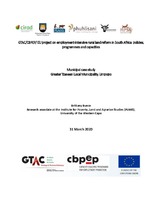Municipal case study: Greater Tzaneen Local Municipality, Limpopo
Abstract
The report provides a way forward for implementing a labour-intensive small-scale farming approach to land redistribution in the Greater Tzaneen Local Municipality (GTM) 1. The scenario presented in Table 8 of this report, involves redistributing 50% of all farmland in GTM (71 550 hectares) to 2745 small-scale farmers. This approach has the potential to create 31 612 net on-farm jobs, inclusive of 2745 self-employment opportunities for farmers and 825 family members. As Table 7 outlines, this would entail a cost of ZAR 79 787 per net job2 created. In addition, numerous jobs could be created in the value chain up and downstream of farms. The model proposes redistributing 13 145 hectares of existing subtropical fruit, citrus and nut orchards and developing 13 495 hectares of new orchards. It would involve an investment of ZAR 2.52 billion in establishment costs 3. An alternative model is also presented which could keep investment costs lower by developing fewer hectares of fruit and nuts but would also create less jobs.
The region’s reputation as one of the leading farming areas for fruit, nuts and fresh produce (vegetables), has proliferated the presence of wage labour opportunities, contract farming and joint ventures (Boche and Anjuere, 2015). The growing population of Tzaneen and the well-established transport system which connects the municipality to nearby towns, cities and national fresh produce markets (NFPMs), presents opportunities for small-scale farmers. There is a vibrant informal value chain, which provides numerous job multipliers for bakkie traders and hawkers. Opportunities also exist to access formal value chains (e.g. supermarkets and processors) and export markets (especially for subtropical fruit). Rather than seeing one market as a panacea for small-scale farmers, this report suggests supporting farmers to access a range of markets, differentiated by the quality of produce.

